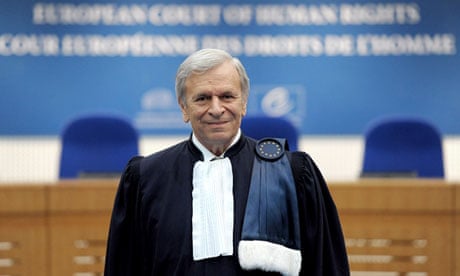MPs aiming to claw back powers from Europe have secretly interviewed candidates to become Britain's next judge at the European court of human rights.
The interviews with MPs and peers introduce an extra level of scrutiny into selecting who will eventually sit on Europe's appeals system.
The development, which Westminster hopes will improve accountability in Strasbourg, was devised by the parliamentary delegation to the Council for Europe and chaired by the Conservative MPs Oliver Heald and Robert Walter. Eurosceptic critics have lambasted the court for being a remote, unrepresentative panel – although judges in Strasbourg are elected.
The byzantine appointments procedure involves members of the Council of Europe, which oversees the ECHR, interviewing candidates from a country's shortlist of three and the whole assembly – several hundred strong – choosing the final winner. Each of the 47 member states has one judge. The UK's representative, Sir Nicolas Bratza, who is also president of the court, retires in November.
Ministers began the process of meeting the three candidates in private this week. The MPs and peers who took part have no formal powers of endorsement or veto but their opinions are bound to be influential.
Ben Emmerson QC, 48, is front runner for the £150,000 a year tax-free post. A veteran of international war crimes tribunals, UN missions, contentious human rights cases and high profile appeals, he is among the most eminent barristers of his generation. A deputy high court judge, he has represented the Wikileaks founder Julian Assange, the British government, anti-war demonstrators, GCHQ whistleblowers and a host of other prominent litigants and defendants.
His two rivals are less well known: Racquel Agnello QC and Paul Mahoney. Agnello, 48, sits as a part-time registrar in the high court, where she deals with bankruptcy and company work. Fluent in French and Portuguese, she has a degree in French judicial studies but has not specialised in human rights work; her practice involves insolvency, commercial litigation, banking and shareholder disputes.
Mahoney, 65, a former law lecturer, worked for the Council of Europe, for more than 30 years. He was the court's registrar – senior legal administrator – from 2001 to 2005. But questions have been raised about his age – reforms backed by the UK last month recommended that ECHR judges should not be "older than 65 years at the date on which their term of office commences".
Attention has therefore focused on Emmerson. At a time when the role of the ECHR – notably in the rollercoaster drama over Abu Qatada's deportation and the UK's reluctance to implement prisoners' voting rights – has become pivotal in domestic politics, the new judge is a highly sensitive appointment.
Oliver Heald MP, a barrister, described the Westminster meetings as "confidential discussions" rather than formal interviews. He told the Guardian: "We are keen to improve democratic accountability. The parliamentary delegation, which is from all the parties, met the three candidates [on Monday and Tuesday].
"It's important that the delegations take a responsible attitude to these elections. The more we know about the candidates, the better … there's everything to be said for involving members of the delegation in meeting the candidates.
"The candidates are people with an interesting take on the way forward for the ECHR. It would be a good thing if other national assemblies [became involved]." On occasions the Strasbourg assembly has rejected other countries' candidates as being of an inadequate standard.
On the experience of being interviewed at Westminster, Emmerson said: "It's an innovative and historic development. I welcome the opportunity to increase democratic scrutiny and legitimacy."
The three candidates will undergo a formal interview in Paris in mid-June. The winner, who will hold the job for nine years, is due to emerge from the Strasbourg election on 25 June.

Comments (…)
Sign in or create your Guardian account to join the discussion